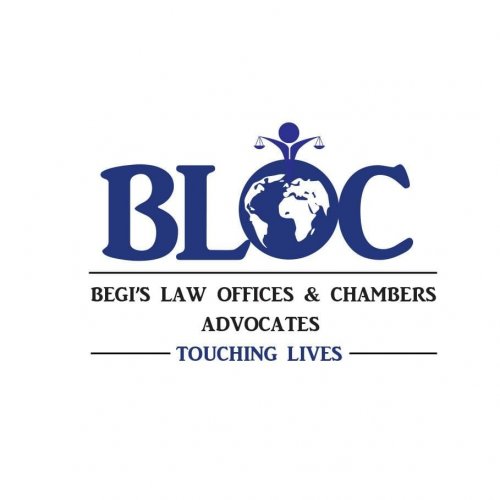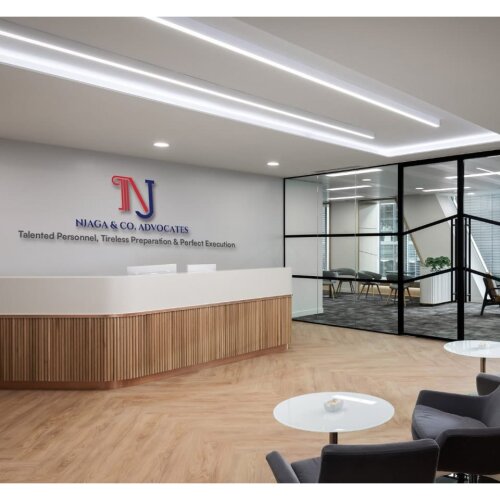Best Collaborative Law Lawyers in Kenya
Share your needs with us, get contacted by law firms.
Free. Takes 2 min.
Free Guide to Hiring a Family Lawyer
Or refine your search by selecting a city:
List of the best lawyers in Kenya
Legal guides written by Adroit Law LLP:
- Kenya Launches Digital Nomad Visa: A Gateway for Remote Workers
- Navigating the Payment System License Maze in Kenya
- Navigating the Complexities of Mining Licenses and Permits in Kenya: A Look into Artisanal and Large-Scale Operations
About Collaborative Law in Kenya
Collaborative Law is an emerging legal discipline in Kenya that focuses on resolving disputes peacefully and without litigation. It is typically used in family law matters, such as divorce and child custody, where it aims to foster amicable agreements between parties. The process involves both parties and their respective lawyers working together in a collaborative fashion to settle disputes outside of court. This approach minimizes conflict, reduces costs, and helps maintain good relationships between parties.
Why You May Need a Lawyer
There are several situations where seeking legal advice in Collaborative Law might be necessary:
- Uncontested Divorce: When both parties agree to part ways amicably and need legal formalization without court trials.
- Child Custody Arrangements: If parents aim to agree on custody and visitation rights without litigation.
- Dividing Property: When separating couples need to fairly and peacefully divide their assets.
- Family Business Disputes: To resolve disagreements related to family-run businesses without animosity.
- Pre- and Post-Nuptial Agreements: When drafting agreements that safeguard individual interests without court battles.
Local Laws Overview
Kenya's legal framework has embraced aspects of Collaborative Law, especially in family law, as part of its efforts to decongest the judicial system. Relevant laws include:
- Marriage Act 2014: Provides a legal framework for marriages, separation, and divorce processes.
- Children’s Act 2001: Outlines the rights of children and principles for custody arrangements.
- Alternative Dispute Resolution Act: Encourages solving disputes using mediation and negotiation rather than litigation.
These laws emphasize resolving family and civil disputes through amicable means, which aligns with the principles of Collaborative Law.
Frequently Asked Questions
What is the primary goal of Collaborative Law?
The primary goal of Collaborative Law is to resolve disputes amicably without going to court, allowing parties to reach a mutually acceptable agreement.
Who participates in the Collaborative Law process?
The process involves both parties in a dispute, their respective lawyers, and sometimes other neutral experts such as financial advisors or child specialists.
Is Collaborative Law legally binding in Kenya?
Yes, agreements reached through Collaborative Law are legally binding once signed and can be enforced in a court of law.
Can Collaborative Law be used in all types of disputes?
While it is most commonly used in family law matters, it can also be applied to other civil disputes where parties prefer a non-confrontational resolution.
What must happen if the Collaborative Law process breaks down?
If parties cannot reach an agreement, they may proceed to traditional litigation, though collaborative lawyers cannot represent them in court, ensuring full commitment to the process.
How does Collaborative Law differ from mediation?
In Collaborative Law, each party has their legal counsel, whereas, in mediation, a neutral third-party mediator assists the parties without providing legal advice.
What are the benefits of using Collaborative Law?
Key benefits include reduced legal costs, quicker resolutions, confidentiality, and preserving relationships between parties.
Is it cheaper than going to court?
Generally, Collaborative Law can be more cost-effective than court litigation, as it often involves fewer legal fees and is less time-consuming.
Do both parties need to agree to use Collaborative Law?
Yes, both parties must mutually agree to proceed with Collaborative Law as it is a consensual process.
Can Collaborative Law be used for international family disputes?
Yes, it can be utilized in international disputes, though additional considerations regarding jurisdiction and enforcement of agreements might be necessary.
Additional Resources
There are several resources and organizations in Kenya that can assist with Collaborative Law:
- Kenya Law Society: Offers resources and can help connect individuals to qualified collaborative lawyers.
- Kenya Family Law Advocates: Provides specific information and assistance regarding family law matters and Collaborative Law.
- Office of the Attorney General: Provides official guidelines and resources for civil and family law practices.
Next Steps
If you are considering Collaborative Law for resolving a dispute, here are some steps to follow:
- Research and Understand: Familiarize yourself with the principles of Collaborative Law and assess if it fits your situation.
- Find a Collaborative Lawyer: Reach out to the Law Society of Kenya or legal directories to find a trained collaborative attorney.
- Schedule a Consultation: Discuss your case with a potential lawyer to see if collaborative methods might work for you.
- Review Agreements: Once a resolution is reached, carefully review any agreements with your lawyer before signing.
- Formalize the Agreement: Ensure that the agreement is legally documented and submitted to the court if necessary.
Using Collaborative Law can provide a peaceful path to resolving disputes, while safeguarding relationships and promoting mutual respect.
Lawzana helps you find the best lawyers and law firms in Kenya through a curated and pre-screened list of qualified legal professionals. Our platform offers rankings and detailed profiles of attorneys and law firms, allowing you to compare based on practice areas, including Collaborative Law, experience, and client feedback.
Each profile includes a description of the firm's areas of practice, client reviews, team members and partners, year of establishment, spoken languages, office locations, contact information, social media presence, and any published articles or resources. Most firms on our platform speak English and are experienced in both local and international legal matters.
Get a quote from top-rated law firms in Kenya — quickly, securely, and without unnecessary hassle.
Disclaimer:
The information provided on this page is for general informational purposes only and does not constitute legal advice. While we strive to ensure the accuracy and relevance of the content, legal information may change over time, and interpretations of the law can vary. You should always consult with a qualified legal professional for advice specific to your situation.
We disclaim all liability for actions taken or not taken based on the content of this page. If you believe any information is incorrect or outdated, please contact us, and we will review and update it where appropriate.
Browse collaborative law law firms by city in Kenya
Refine your search by selecting a city.















